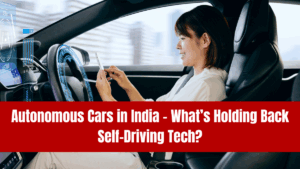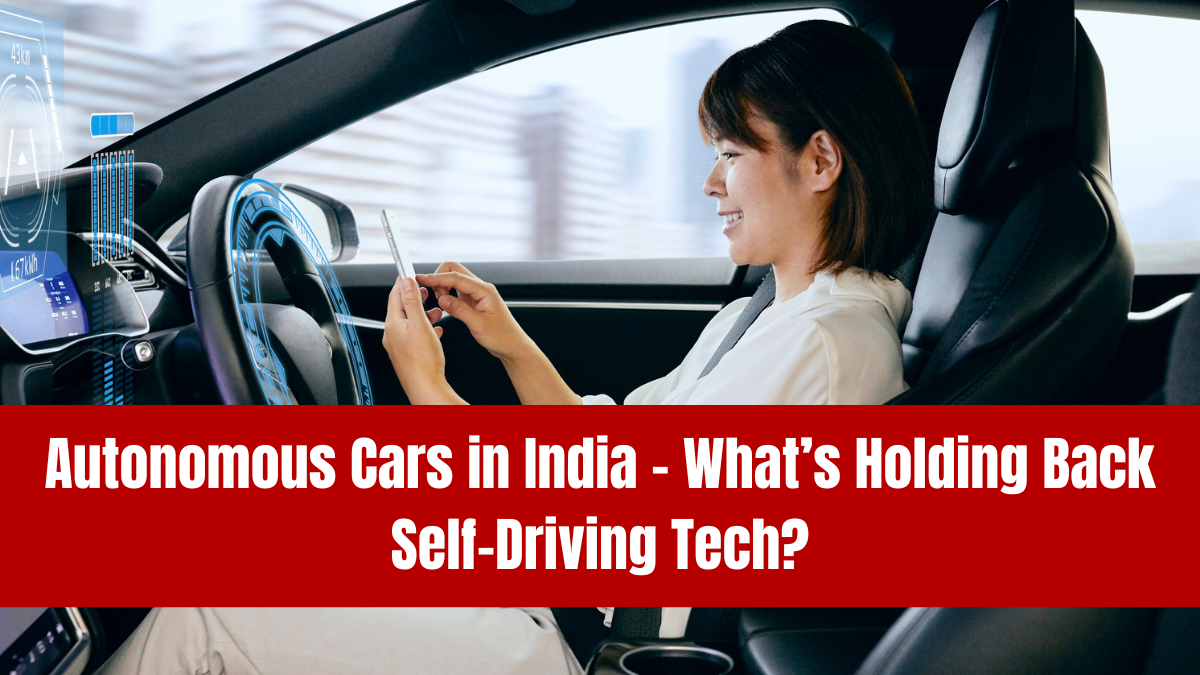Autonomous cars have been a hot topic worldwide, but in September 2025, India still lags behind in adopting self-driving technology. While global players like Tesla, Waymo, and Mercedes are testing advanced autonomous vehicles abroad, India continues to face multiple barriers in making these cars a reality.
From infrastructure limitations and regulatory gaps to cost and consumer trust issues, the Indian auto industry still has a long way to go before self-driving vehicles become mainstream.

The Current Status of Autonomous Cars in India
In 2025, India has witnessed limited pilot projects in metro cities such as Bengaluru, Hyderabad, and Pune, where tech companies are experimenting with semi-autonomous vehicles under controlled environments. However, fully autonomous cars are not yet commercially available.
Most vehicles in India currently feature ADAS (Advanced Driver Assistance Systems) like adaptive cruise control, lane assist, and auto emergency braking. These are Level 2 autonomy features, far from the Level 5 fully self-driving capability seen in some global prototypes.
Key Barriers to Self-Driving Cars in India
1. Road Infrastructure Challenges
-
Unclear Lane Markings: Many Indian roads lack proper markings, making AI navigation difficult.
-
Mixed Traffic Conditions: Cars, bikes, rickshaws, trucks, and even pedestrians share the same lanes.
-
Poor Road Quality: Potholes, broken roads, and flyover works disrupt smooth autonomous navigation.
2. Legal and Regulatory Framework
India still lacks clear legislation for autonomous driving. While the Ministry of Road Transport and Highways (MoRTH) is working on draft guidelines, there are no rules governing liability in case of accidents involving self-driving cars.
3. High Costs
Autonomous driving tech involves costly hardware such as LiDAR, radar, and advanced sensors. Adding these to mass-market cars would make them unaffordable for the majority of Indian buyers.
4. Consumer Trust and Safety
Indians are still hesitant to trust a car that drives itself. Surveys in 2025 show that over 70% of Indian buyers prefer human control over AI driving, due to fear of system failure or hacking.
5. Connectivity and Data
Autonomous cars require high-speed internet (5G and beyond) for real-time navigation. While 5G is expanding, rural areas and even some urban zones face inconsistent connectivity.
Industry Efforts and Pilot Projects
Despite challenges, several players are testing autonomous technologies:
-
Tata Motors and Infosys: Testing semi-autonomous software for urban mobility.
-
Ola Electric: Exploring autonomous shuttles for campuses.
-
International Brands: Companies like Tesla and Hyundai have expressed interest but are waiting for clearer regulations.
Startups in Bengaluru are also developing AI-based driving systems for commercial fleets and logistics, aiming for Level 3 autonomy by 2027.
The Role of Government Policies
The Indian government is cautiously approaching self-driving technology. In September 2025:
-
No official approval for Level 4/5 autonomous cars exists.
-
Pilot testing zones are being created in smart cities.
-
EV push indirectly supports autonomy, since most autonomous cars globally are electric.
MoRTH is working on frameworks for insurance, liability, and cybersecurity for autonomous cars, but legislation may take another 2–3 years.
Global vs Indian Market
Globally, autonomous vehicles are progressing faster:
-
USA: Waymo and Tesla are testing Level 4 vehicles.
-
Europe: Mercedes-Benz EQS has achieved limited approval for Level 3 autonomy.
-
China: Baidu and Xpeng lead autonomous taxi trials.
In India, the market is still focused on affordable EVs and ADAS features rather than full autonomy.
Future Possibilities in India
Experts believe India could gradually adopt autonomous cars in phases:
-
2025–2027: Wider adoption of Level 2+ ADAS.
-
2028–2030: Limited Level 3 autonomy in premium cars.
-
2030 onwards: Possible Level 4 commercial use (robotaxis, logistics) in smart cities.
Mass adoption will depend on better infrastructure, policy clarity, and affordability.
Who Will Benefit from Autonomous Cars in India?
Once adopted, autonomous cars could benefit:
-
Daily Commuters: Stress-free travel in congested cities.
-
Elderly and Disabled People: More mobility independence.
-
Logistics and Fleets: Reduced labor costs with AI-driven trucks.
-
Tech-Savvy Buyers: Early adopters who want cutting-edge innovation.
Verdict: Are Autonomous Cars Still a Distant Dream in India?
The reality is that autonomous cars in India remain at least a decade away from mass adoption. While progress is being made through pilot projects, ADAS-equipped cars, and policy discussions, India’s complex traffic, legal gaps, and affordability issues continue to slow things down.
For now, Indian buyers can expect incremental advancements in driver assistance features, but fully self-driving cars may not hit public roads until the early 2030s.
FAQs
Are autonomous cars available in India in 2025?
No, only pilot projects and ADAS-equipped cars are available; fully autonomous cars are not yet legal.
What is the biggest barrier to autonomous cars in India?
Poor road infrastructure, lack of laws, and affordability remain the main barriers.
Which companies are testing autonomous cars in India?
Tata Motors, Infosys, Ola Electric, and several Bengaluru-based startups are testing semi-autonomous vehicles.
When can we expect self-driving cars in India?
Experts believe 2030 onwards for limited Level 4 adoption, starting with commercial fleets.
Are autonomous cars safe for Indian roads?
Not yet. Mixed traffic and unpredictable conditions make India one of the toughest markets for self-driving technology.
